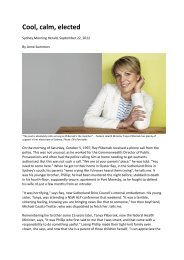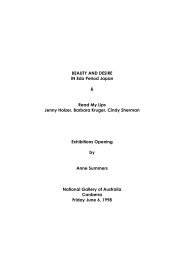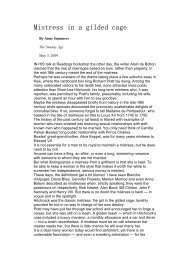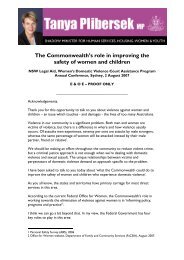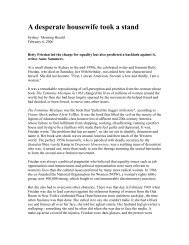Putting Equality Back on the Agenda - The Looking Glass
Putting Equality Back on the Agenda - The Looking Glass
Putting Equality Back on the Agenda - The Looking Glass
You also want an ePaper? Increase the reach of your titles
YUMPU automatically turns print PDFs into web optimized ePapers that Google loves.
<strong>The</strong> Howard government evidently feared that this ruling would lead to an<br />
avalanche of single women seeking IVF in order to have babies. Although<br />
<strong>the</strong>re was perceived to be a fertility crisis at <strong>the</strong> time, with <strong>the</strong> government<br />
introducing a so-called “baby b<strong>on</strong>us” in order to encourage women to have<br />
more babies, <strong>the</strong>re was a clear prejudice <strong>on</strong> <strong>the</strong> part of <strong>the</strong> government as<br />
to <strong>the</strong> sorts of parents who would be favoured. <strong>The</strong> government did not<br />
want single women having babies and it definitely did not want female<br />
couples taking advantage of IVF in order to reproduce.<br />
<strong>The</strong> government took <strong>the</strong> extraordinary and unprecedented acti<strong>on</strong> of<br />
supporting <strong>the</strong> Catholic Bishops C<strong>on</strong>ference, agreeing it could go to <strong>the</strong><br />
High Court to challenge <strong>the</strong> Sex Discriminati<strong>on</strong> Act. <strong>The</strong> High Court upheld<br />
<strong>the</strong> ruling of <strong>the</strong> Federal Court, and John Howard went spare.<br />
“We want to change <strong>the</strong> Sex Discriminati<strong>on</strong> Act,” he said <strong>on</strong> Melbourne<br />
radio, “so that if a state, as a number do at present, decides to restrict <strong>the</strong><br />
IVF program to married or de facto heterosexual couples, it can do so”. xii<br />
Interestingly, nei<strong>the</strong>r Federal nor High Court had made menti<strong>on</strong> of <strong>the</strong><br />
sexuality of people protected under <strong>the</strong> marital status provisi<strong>on</strong>s of <strong>the</strong> Sex<br />
Discriminati<strong>on</strong> Act. It was <strong>the</strong> Prime Minister who was so exercised by <strong>the</strong><br />
thought of lesbians having fertility treatment in order to c<strong>on</strong>ceive that he<br />
was willing to throw out <strong>the</strong> entire marital status provisi<strong>on</strong> of <strong>the</strong> Act.<br />
<strong>The</strong> c<strong>on</strong>sequences of this would have been enormous. Protecti<strong>on</strong> from<br />
discriminati<strong>on</strong> <strong>on</strong> <strong>the</strong> grounds of marital status has always been a<br />
fundamental part of <strong>the</strong> legislati<strong>on</strong>. It had ensured that married women<br />
would not suffer discriminati<strong>on</strong> in employment as <strong>the</strong>y had in <strong>the</strong> past. It<br />
was not so many years since <strong>the</strong> aboliti<strong>on</strong> of <strong>the</strong> marriage bar, that absurd<br />
requirement of <strong>the</strong> public service, <strong>the</strong> banks and some o<strong>the</strong>r major<br />
employers that women resign from <strong>the</strong>ir permanent jobs when <strong>the</strong>y<br />
married.<br />
In doing so, of course <strong>the</strong>y lost all <strong>the</strong>ir entitlements and opportunities for<br />
promoti<strong>on</strong>.<br />
Discriminati<strong>on</strong> against married women has been a shameful and pervasive<br />
feature of employment in Australia. I met a woman recently who told me of<br />
her experience at <strong>the</strong> Comm<strong>on</strong>wealth Bank when she returned from<br />
maternity leave. She wanted to work full-time but was told she would have<br />
to sit <strong>the</strong> school leavers’ exam and <strong>the</strong>n undergo a probati<strong>on</strong> period for six<br />
m<strong>on</strong>ths, during which time she would receive half pay. I asked her when<br />
this was, assuming it must have been back in <strong>the</strong> bad old 1960s. “1986,”<br />
she said.<br />
I could scarcely believe it: in 1986 I was heading up <strong>the</strong> Office of <strong>the</strong> status<br />
of Women in Canberra and thought that things were starting to improve.<br />
<strong>The</strong> Sex Discriminati<strong>on</strong> Act had been in force for two years, <strong>the</strong> Affirmative<br />
Acti<strong>on</strong> legislati<strong>on</strong> had been trialled for twelve m<strong>on</strong>ths in <strong>the</strong> private sector,<br />
including by <strong>on</strong>e bank, and <strong>the</strong> legislati<strong>on</strong> had just been enacted. Yet here<br />
8




